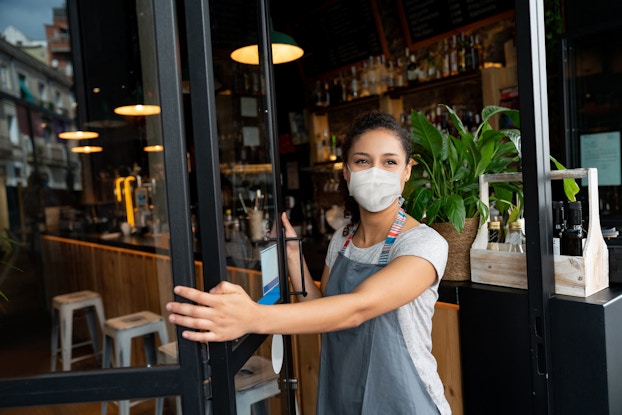
Many businesses have been struggling to recover since the federal and state governments started to lift the shelter-in-place orders as a preventative measure for slowing the spread of the coronavirus. Hospitality and tourism businesses, in particular, have been struggling to recoup the losses they sustained as a result of the global COVID-19 pandemic, but some have managed to start rebuilding by pivoting their business model or strategy.
The following five companies in the hospitality industry have successfully pivoted to stay afloat in the current era. Here’s what they did.
[Read: Hyatt, Sandals and citizenM Share Strategies to Revive Their Hospitality Businesses]
Domio Boutique Hotels
Domio was founded in 2016 by Jay Roberts and Adrian Lam as a way to prevent traveling friends or family members from being separated into different rooms – or even different hotels across town. The unique hospitality company created apartment-like hotel rooms that range from two to five times larger than average hotel room sizes at a more affordable rate than booking several different rooms.

Interested in a small business membership?
Find out how the U.S. Chamber of Commerce can help your company grow and thrive in today's rapidly-evolving business environment. Connect with our team to learn how a small business membership can benefit your bottom line and help you achieve your goals.
Shortly after quarantine orders were issued, the apartment-hotel hospitality company decided to offer free housing to medical professionals and first responders in Miami, Chicago and Nashville. Not only did this allow Domio to remain active during the early stages of the pandemic, it also allowed them to serve communities in these major metropolitan areas. Medical professionals, first responders and other qualifying individuals were allowed to stay up to five nights for free and had the option to extend their stay at a 35% discounted rate.
Kauai Soul Travel
While the beginning of 2020 was the most lucrative year for Kauai Soul Travel, a boutique family owned and operated sightseeing company in Kauai, the arrival of the coronavirus brought Hawaii’s economy to a halt. Maria Camero, the founder of Kauai Soul Travel, had to pivot her business in order to survive. In April, Camero decided to start a personal shopping and grocery delivery service for kupuna, a Hawaiian grandparent or elder, and other individuals who are at higher risk of contracting COVID-19. Camero’s service also assisted quarantined travelers who were unable to go to the store. When safety guidelines are lifted and Kauai Soul Travel can resume giving guided tours, Camero plans to decrease the tour group capacity to seven people, thoroughly clean her van between tours and require all customers to wear masks and frequently sanitize their hands.
[Read: 5 Small Business Owners on How COVID-19 Has Changed Customer Service]
The pandemic also forced the company to adopt newer forms of payment technology to stay in business.
Vegas Party People
Nevada’s Transportation Authority issued new guidelines on May 4 in response to COVID-19 that forced the Vegas Party People limo operators to pivot and adapt. The new transportation carrier guidelines included implementing rigorous cleaning regimens, providing masks and hand sanitizer for their passengers and drivers and enforcing social distancing guidelines. Furthermore, the company has limited their capacity in order to comply with COVID-19 guidelines, now offering half the rate of occupancy per vehicle.
However, the pandemic also forced the company to adopt newer forms of payment technology to stay in business. The new mandated guidelines require touchless payment methods, which resulted in Vegas Party People updating their website to enable customers to pay and tip by credit card as well as with cryptocurrency.
Sixthman
Sixthman, a cruise company known for music-themed cruises, such as the infamous KISS Kruise, had its business grind to a halt. The cruise line has been grounded since the beginning of the pandemic, forcing them to pivot to stay in business. In an attempt to avoid the fate of the damage done in the tourism industry, Sixthman launched a new brand called Sixthman Services to help brands, promoters, bands, conferences and communities throw socially distanced, outdoor, on-land events. This pivot has allowed them to retain most of their staff and venture into the virtual event market.
Coeur d’Alene Casino
On the weekend when the Coeur d’Alene Casino should have been celebrating its 27th anniversary, the casino’s CEO, Laura Stensgar, had to close the casino due to COVID-19. And while the closure was a necessary measure to take, Stensgar was concerned about the impact the loss of revenue would have on not only the casino, but also on the Coeur d’Alene Tribe and greater community. For these reasons, Stensgar strived to reopen the business as soon as possible.
On April 27, the casino was the first in the country to welcome back guests post-quarantine. To ensure the health and safety of the casino’s staff and returning gamers, the Coeur d’Alene Tribe assembled a task force to develop a combination of protocols, including limiting the number of people allowed in the casino, enforcing social distancing measures and instituting mask and temperature check requirements for everyone who enters the building. While Stensgar says the casino did suffer financial losses during its month-long closure, they have since recouped their losses. “Our protocols have been in place since day one,” said Stensgar, “and they have safeguarded us from any type of outbreak.”
[Read: Experts Unpack the Massive Cross-Industry Impact of the Coronavirus, From Retail to Hospitality]
CO— aims to bring you inspiration from leading respected experts. However, before making any business decision, you should consult a professional who can advise you based on your individual situation.
Follow us on Instagram for more expert tips & business owners’ stories.
CO—is committed to helping you start, run and grow your small business. Learn more about the benefits of small business membership in the U.S. Chamber of Commerce, here.







